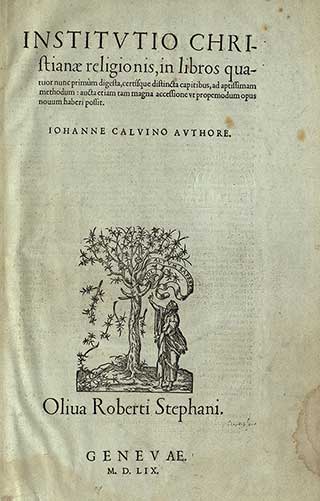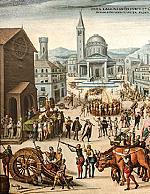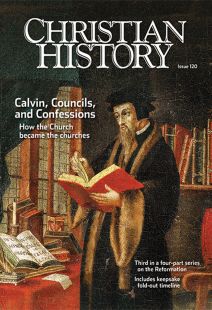Words to ponder from Calvin’s Institutes

[detail from the title page of an edition of Calvin’s Institutes]
OUR feeling of ignorance, vanity, want, weakness, in short, depravity and corruption, reminds us, that in the Lord, and none but He, dwell the true light of wisdom, solid virtue, exuberant goodness. We are accordingly urged by our own evil things to consider the good things of God; and, indeed, we cannot aspire to Him in earnest until we have begun to be displeased with ourselves. For what man is not disposed to rest in himself? Who, in fact, does not thus rest, so long as he is unknown to himself; that is, so long as he is contented with his own endowments, and unconscious or unmindful of his misery? Every person, therefore, on coming to the knowledge of himself, is not only urged to seek God, but is also led as by the hand to find him. …
Man never attains to a true self-knowledge until he has previously contemplated the face of God, and come down after such contemplation to look into himself. For (such is our innate pride) we always seem to ourselves just, and upright, and wise, and holy, until we are convinced, by clear evidence, of our injustice, vileness, folly, and impurity.—Book 1, Chapter 1, “The Knowledge of God and of Ourselves Mutually Connected”
WHENEVER God is pleased to make way for his providence, he even in external matters so turns and bends the wills of men, that whatever the freedom of their choice may be, it is still subject to the disposal of God. That your mind depends more on the agency of God than the freedom of your own choice, daily experience teaches. Your judgment often fails, and in matters of no great difficulty, your courage flags; at other times, in matters of the greatest obscurity, the mode of explicating them at once suggests itself, while in matters of moment and danger, your mind rises superior to every difficulty.—Book 2, Chapter 4, “How God Works in the Hearts of Men”
THOSE whom the Lord has chosen and honoured … must prepare for a hard, laborious, troubled life, a life full of many and various kinds of evils. …Having begun this course with Christ the first-born, he continues it towards all his children. … How powerfully should it soften the bitterness of the cross, to think that the more we are afflicted with adversity, the surer we are made of our fellowship with Christ; by communion with whom our sufferings are not only blessed to us, but tend greatly to the furtherance of our salvation.—Book 3, Chapter 8, “Of Bearing the Cross”
Order Christian History #120: Calvin, Councils, and Confessions in print.
Subscribe now to get future print issues in your mailbox (donation requested but not required).
YOU may everywhere find, both from the decrees of synods, and from ancient writers, that whatever the church possessed, either in lands or in money, was the patrimony of the poor [i.e., was meant to be given to the poor]. Accordingly, the saying is ever and anon sounded in the ears of bishops and deacons, “Remember that you are not handling your own property, but that destined for the necessities of the poor; if you dishonestly conceal or dilapidate it, you will be guilty of blood.” Hence they are admonished to distribute them to those to whom they are due, with the greatest fear and reverence, as in the sight of God, without respect of persons.—Book 4, Chapter 4, “Of the State of the Primitive Church, and of the Government in Use Before the Papacy”
THE office of the sacraments differs not from the word of God; and this is to hold forth and offer Christ to us, and, in him, the treasures of heavenly grace. They confer nothing, and avail nothing, if not received in faith, just as wine and oil, or any other liquor, however large the quantity which you pour out, will run away and perish unless there be an open vessel to receive it.—Book 4, Chapter 14, “Of the Sacraments”
These excerpts were translated by Henry Beveridge. For more on the Institutes, see issue 116, 25 Writings that Changed the Church and the World. It ranked #3 on our list.
This article is from Christian History magazine #120 Calvin, Councils, and Confessions. Read it in context here!
Christian History’s 2015–2017 four-part Reformation series is available as a four-pack. This set includes issue #115 Luther Leads the Way; issue #118 The People’s Reformation; issue #120 Calvin, Councils, and Confessions; and issue#122 The Catholic Reformation. Get your set today. These also make good gifts.
By John Calvin
[Christian History originally published this article in Christian History Issue #120 in 2016]
Next articles
A faith that could not be contained
How Reformed Christians spread across a continent
Jennifer Powell McNuttGod our only comfort: German confessions
Excerpts from the Book of Concord and the Heidelberg Confession
variousSupport us
Christian History Institute (CHI) is a non-profit Pennsylvania corporation founded in 1982. Your donations support the continuation of this ministry
Donate






